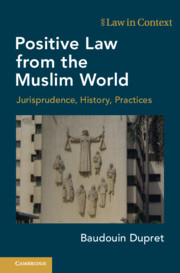Book contents
- Positive Law from the Muslim World
- The Law in Context Series
- Positive Law from the Muslim World
- Copyright page
- Dedication
- Contents
- Acknowledgments
- Introduction: Law Properly So Called, from an Islamic Vantage Point
- Part I The Concept of Law
- Part II Historical Ontologies
- Part III Legal Praxeologies
- 7 General and Particular: The Legal Rule and an Islamic Swimsuit in a Secular Context
- 8 Filling Gaps in Legislation: The Use of Fiqh in Contemporary Courts in Morocco, Egypt, and Indonesia
- 9 Playing by the Rules: The Search for Legal Grounds in Homosexuality Cases – Indonesia, Lebanon, Egypt, and Senegal
- Conclusion: A Praxeological Approach to Positive Law
- Notes
- Bibliography
- Index
8 - Filling Gaps in Legislation: The Use of Fiqh in Contemporary Courts in Morocco, Egypt, and Indonesia
from Part III - Legal Praxeologies
Published online by Cambridge University Press: 16 June 2021
- Positive Law from the Muslim World
- The Law in Context Series
- Positive Law from the Muslim World
- Copyright page
- Dedication
- Contents
- Acknowledgments
- Introduction: Law Properly So Called, from an Islamic Vantage Point
- Part I The Concept of Law
- Part II Historical Ontologies
- Part III Legal Praxeologies
- 7 General and Particular: The Legal Rule and an Islamic Swimsuit in a Secular Context
- 8 Filling Gaps in Legislation: The Use of Fiqh in Contemporary Courts in Morocco, Egypt, and Indonesia
- 9 Playing by the Rules: The Search for Legal Grounds in Homosexuality Cases – Indonesia, Lebanon, Egypt, and Senegal
- Conclusion: A Praxeological Approach to Positive Law
- Notes
- Bibliography
- Index
Summary
In this chapter we describe the methods judges use to fill what is often called “the silences of the law,” that is, gaps in legislation, in the domain of family law in three countries: Morocco, Egypt, and Indonesia. More specifically, we explore the role and place of uncodified fiqh in contemporary legislation and adjudication in the field of personal status law. We proceed in four steps. First, we address the institutional and legal transformations affecting law, especially family law, in Morocco, Egypt, and Indonesia, focusing on what may be termed a legal revolution that made it possible to speak of law in terms of codes and to classify fiqh as a subsidiary source when legislation is silent. Second, we turn to the specific domain of family law, briefly discussing statute law, case law, and legal practice in each of the three countries. Third, on the basis of marriage authentication cases (ithbât al-zawâj, ithbât al-nikâh), we examine how, practically speaking, judges seek a solution in the body of fiqh. Finally, we develop an argument about the nature of judicial work in the management of “references to Islam” within the framework of positive, codified, and standardized law.
Keywords
- Type
- Chapter
- Information
- Positive Law from the Muslim WorldJurisprudence, History, Practices, pp. 194 - 218Publisher: Cambridge University PressPrint publication year: 2021



